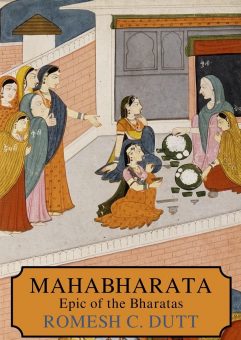his own distinct style of narration, or to improve on the style of the original with his own decorations.
Such is the scheme I have adopted in presenting an Epic of ninety thousand Sanscrit couplets in about two thousand English couplets.
The excellent and deservedly popular prose translation of the Odyssey of Homer by Messrs. Butcher and Lang often led me to think that perhaps a prose translation of these selected passages from the Maha-bharata might be more acceptable to the modern reader. But a more serious consideration of the question dispelled that idea. Homer has an interest for the European reader which the Maha-bharata cannot lay claim to; as the father of European poetry he has a claim on the veneration of modern Europe which an Indian poet can never pretend to. To thousands of European readers Homer is familiar in the original, to hundreds of thousands he is known in various translations in various modern languages. What Homer actually wrote, a numerous class of students in Europe wish to know; and a literal prose translation therefore is welcome, after the great Epic has been so often translated in verse. The case is very different with the Maha-bharata, practically unknown to European readers. And the translators of Homer themselves gracefully acknowledge, “We have tried to transfer not all the truth about the poem, but the historical truth into English. In this process Homer must lose at least half his charm, his bright and equable [375] speed, the musical current of that narrative, which, like the river of Egypt, flows from an undiscoverable source, and mirrors the temples and the palaces of unforgotten gods and kings. Without the music of verse, only a half truth about Homer can be told.”
Another earnest worker of the present day, who is endeavouring to interpret to modern Englishmen the thoughts and sentiments and poetry of their Anglo- Saxon ancestors, has emphatically declared that “of all possible translations of poetry, a merely prose translation is the most inaccurate.” “Prose,” says Mr. Stopford Brooke, further on, “no more represents poetry than architecture does music. Translations of poetry are never much good, but at least they should always endeavour to have the musical movement of poetry, and to obey the laws of the verse they translate.”
This appears to me to be a very sound maxim. And one of my greatest difficulties in the task I have undertaken has been to try and preserve something of the “musical movement” of the sonorous Sanscrit poetry in the English translation. Much of the Sanscrit Epic is written in the well-known Sloka metre of sixteen syllables in each line, and I endeavoured to choose some English metre which is familiar to the English ear, and which would reproduce to some extent the rhythm, the majesty, and the long and measured sweep of the Sanscrit verse. It was necessary to adopt such a metre in order to transfer something of the truth about the Maha-bharata into English, for without such reproduction or imitation of the musical movement of the original very much less than a half
truth is told. My kind friend Mr. Edmund Russell, impelled by that enthusiasm for Indian poetry and Indian art which is a part of him, rendered me valuable help and assistance in this matter, and I gratefully acknowledge the benefit I have derived from his advice and suggestions. After considerable trouble and anxiety, and after rendering several books in different English metres, I felt convinced that the one finally adopted was a nearer approach to the Sanscrit Sloka than any other familiar English metre known to me.
I have recited a verse in this English metre and a Sloka in presence of listeners who have a better ear for music than myself, and [376] they have marked the close resemblance. I quote a few lines from the Sanscrit showing varieties of the Sloka metre, and comparing them with the scheme of the English metre selected.
−⏑−−⏑−−−|−⏑−⏑⏑−⏑⏑
Esha Kuntisutah sriman | esha madhyama Pandavah
−⏑−−⏑−−⏑|⏑−−−⏑−⏑−
Esha putro Mahendrasya | Kurunam esha rakshita
– Maha-bharata, i. 5357.
−⏑−⏑−⏑−⏑|−⏑−⏑−⏑−
Yet I doubt not through the ages | one increasing purpose runs
−⏑−⏑−⏑−⏑|−⏑−⏑−⏑−
And the thoughts of men are widened I with the process of the suns
– Locksley Hall.
−−⏑⏑⏑−−⏑|−⏑−⏑⏑−⏑−
Malancha samupadaya | kanchanim samalamkritam
⏑⏑−−⏑−−⏑|−⏑−⏑⏑−⏑⏑
Avatirna tato rangam | Draupadi Bharatarshabha
– Maha-bharata, i. 6974.
−⏑−⏑−⏑−⏑|−⏑−⏑−⏑−
Visions of the days departed | shadowy phantoms filled my brain;
−⏑−⏑−⏑−⏑|−⏑−⏑−⏑−
Those who live in history only | seemed to walk the earth again
– Belfry of Bruges.
⏑−⏑⏑⏑−−⏑|−−⏑⏑⏑−⏑−
Asuryam iva suryena | nirvatam iva vayuna
−⏑−−⏑−−⏑|−−−−⏑−⏑⏑
Bhasitam hladitanchaiva | Krishnenedam sado hi nah
– Maha-bharata, ii. 1334.
−⏑−⏑−⏑−⏑|−⏑−⏑−⏑−
Quaint old town of toil and traffic | quaint old town of art and song,
−⏑−⏑−⏑−⏑|−⏑−⏑−⏑−
Memories haunt thy pointed gables, | like the rooks that round thee throng.
– Nüremberg .
Pages: 1 2 3 4 5 6 7 8 9 10 11 12 13 14 15 16 17 18 19 20 21 22 23 24 25 26 27 28 29 30 31 32 33 34 35 36 37 38 39 40 41 42 43 44 45 46 47 48 49 50 51 52 53 54 55 56 57 58 59 60 61 62 63 64 65 66 67 68 69 70 71 72 73 74 75 76 77 78 79 80 81




